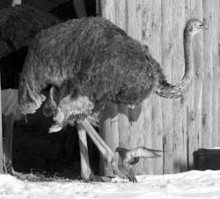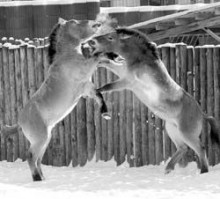The cold weather is forcing people to take care of themselves, as well as animals, especially exotic ones. While you can dress a dog in overalls and a hat, it is far more difficult to deal with an elephant in a circus or a zoo. Strange reports are coming from frost-bound neighboring Russia: the zoo in Lipetsk is going to be giving its macaques 100 grams of Cahore wine a day to keep them from catching cold, and the animal tamers at Taisia Kornilova’s Around the World circus show, now on tour in Yaroslavl, are giving the elephants vodka to keep them warm. The tamers dilute a bottle of vodka in a bucket of water, and the elephants find this beverage very tasty, IA REGNUM reports. The macaques are not turning their noses up at the Cahore, either. The Day contacted some Ukrainian zoos and circuses to see how exotic animals feel in the winter and whether they need alcohol “in doctor-prescribed doses” or any other drinks.
“Elephants don’t need vodka,” says Volodymyr Shevchenko, artistic director of the Kyiv Circus. “We just keep all the animals in heated premises, so they don’t feel cold or fall ill.” Animals react to cold exactly the way humans do. Some of them experience a change of mood in winter, while others develop rheumatism.
Animals that need warmth are housed in well-heated premises at the Kyiv Zoo, which has its own self-contained boiler room. Elephants, European bison, horses, felines, and monkeys are kept at the exact temperature that suits them. They even feel better in the winter because it may be too hot in the summer months. Meanwhile, “frost-proof” animals remain outdoors. For example, camels can tolerate even a 30C frost. “Their main concern is to eat,” says zoo manager Liubov Korotka. “In winter the animals are issued additional food.” Kyiv’s bears do not hibernate: they just take a nap and wake up to eat another portion of food.
Meanwhile, Yalta’s she-bears Masha and Dasha not only refused to hibernate this winter but even gave birth to cubs. “One bear went into hibernation, four others didn’t, and the two she-bears bore little ones,” says Oleh Zubkov, director of the Yalta zoo “Kazka” (“Fairy Tale”) which can rightfully be called this country’s main “zoological maternity home.” “Camels and llamas are used to cold weather. We also let the kangaroos and zebras out, only monkeys and certain species of exotic birds are kept indoors at all times. None of the animals are sick; they all have good immunity. It’s a good thing that so far there are no frosts, and roses are still blooming at the zoo. When the lake freezes, we will also hide the swans. The peacocks tolerate up to minus 27C.” At “Kazka,” the animals are also better fed in the winter and are furnished with warm mats. As for the mood of the zoo’s inhabitants, it only improves in wintertime, in direct proportion to the reduced number of visitors. “The animals are now taking great pleasure in communicating with the zoo employees,” Zubkov says.
So we don’t need to worry about animals, except for stray cats and dogs: this problem has not been solved, and nobody takes them to warm premises in the frosty weather or gives them extra food.








